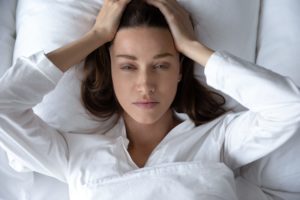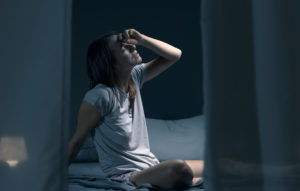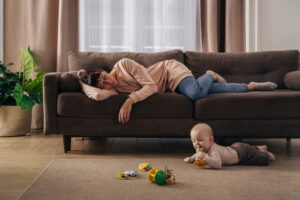When you buy through our links, we may earn a commission. Products or services may be offered by an affiliated entity. Learn more.
Night Sweats: Causes and Tips to Prevent Sweating at Night
The term “night sweats” refers to the experience of sweating excessively while sleeping at night. In severe instances, one may even wake up to find their pajamas or bedding drenched in sweat. Unfortunately, night sweats are a common sleep problem, waking you in the middle of the night and leaving you uncomfortable. We examine what causes night sweats and provide tips to sweat less at night.
Is Your Sleep Disruption a Problem
If you’re consistently struggling to sleep, there may be underlying sleep issues at play. Answer three questions to better understand your sleep.
Why Am I Sweating at Night?
You could be sweating during the night for one of many reasons, including heavy bedding or running a fever. Most people who experience night sweats likely do not have a serious underlying medical issue – especially if their night sweats are mild, happen less frequently, and do not accompany daytime symptoms .
That said, sometimes there is an underlying health explanation for night sweats. Suddenly sweating at night can be the first sign of a health issue and a visit to your doctor can help you rule out the following possibilities:
- Fever and infection: When someone has a fever, the body typically reacts by sweating. Fevers usually occur when a person has an infection, most commonly from viruses, but also from less common infectious diseases and bacteria.
- Hormonal changes: Fluctuating hormones can cause night sweats, which is why they often appear during menopause, when a person stops menstruating. Night sweats are common in up to 80% of U.S. adults experiencing menopause. Changes in hormones due to other conditions, like pregnancy or a thyroid disorder, may also cause night sweats.
- Medical issues: A variety of disorders can have night sweats as a symptom, including types of cancer, spinal cord injury, chronic fatigue syndrome, and mercury poisoning. People with sleep disorders are more likely to have night sweats, but experts do not yet know if sleep disorders cause night sweats, or if night sweats make it more likely a person will be screened for sleep disorders.
- Medication side effects: Many medications can cause night sweats. Most commonly, antidepressants can cause increased sweating, including at night. Some diabetes medications, hormone-altering medications, and cholinergic drugs may also cause sweating as a side effect to changes occurring within the body.
Night Sweats in Women vs. Men
There isn’t high-quality, recent data exploring how nights sweats occur according to sex and gender. However, people assigned female at birth are more likely to experience night sweats during perimenopause and menopause.
On average, menopause begins at age 51. However, perimenopause, or the beginning of the transition to menopause, begins an average of 3.8 years before menopause. People assigned female at birth may experience both night sweats and daytime sweating episodes, called hot flashes, during perimenopause and for 10 years after the start of menopause.
Because of the hormonal changes associated with pregnancy, people may also be more likely to experience night sweats while pregnant. One study found that around 27% of pregnant women reported having night sweats that disturbed their sleep and were slightly more common during the third trimester.

Other Potential Reasons for Sweating at Night
There are a few other potential reasons a person may wake up sweating at night.
- Bedroom temperature: When the body becomes overheated, it sweats to reduce core body temperature. If a person’s bedroom temperature is too hot at night, they may wake up sweating, as their body tries to cool off. For most people, the ideal bedroom temperature falls between 60 and 68 degrees Fahrenheit.
- Bedding and mattress: Even if a person’s bedroom is cool enough, the materials and thickness of their bedding, pajamas, and mattress could contribute to overheating, thus causing night sweating. Thicker, heavier fabrics are often warmer and retain heat more than others. Memory foam mattresses may be more likely to trap heat as well.
- Eating and drinking habits: Certain foods may make sweating during the night more likely. Consuming foods before bed that are high in spice, fat, or sugar is more likely to cause indigestion and sweating during sleep. Alcohol is also associated with more night sweats.
How to Avoid Night Sweats
If you’ve been waking up at night in a sweat, first evaluate your sleep environment. Does it feel too warm? The ideal environment for sleep should be cool, promoting the natural cooling your body experiences during sleep. Check your thermostat or, if you suspect your bedroom is running warmer than the rest of the house, consider purchasing a small digital thermostat to check your bedroom temperature.
Next, think about what materials make up your pajamas and bedding. If you’re wearing long sleeves and pants, opt for something with less coverage. Similarly, breathable, more airy pajamas might help. If you’re sweating under multiple blankets, a heavy quilt, or a thick down comforter, swapping out thinner, lighter blankets might be called for.
If you live in a warmer climate and feel like night sweats are unavoidable, try ways to cool down before going to sleep. Sitting in front of a fan or having a small amount of cool water before going to bed may help reduce your body temperature.

When to Get Help for Night Sweats
If you experience night sweats on a regular basis and know they are not the result of your bedroom temperature or bedding, see a doctor for evaluation. Night sweats have many possible causes, including some serious medical causes, and a doctor can ask the right questions to determine the best course of action. Once they’ve assessed your medical history, they can recommend relevant tests and treatment suited for your unique situation.
Many people who experience night sweats have no underlying health problem. That said, it is still important to be evaluated in order to rule out potential underlying causes of the night sweats.
Medical Disclaimer: The content on this page should not be taken as medical advice or used as a recommendation for any specific treatment or medication. Always consult your doctor before taking a new medication or changing your current treatment.

Still have questions? Ask our community!
Join our Sleep Care Community — a trusted hub of sleep health professionals, product specialists, and people just like you. Whether you need expert sleep advice for your insomnia or you’re searching for the perfect mattress, we’ve got you covered. Get personalized guidance from the experts who know sleep best.
References
4 Sources
-
Smetana, G. (2024 January). Evaluation of the patient with night sweats or generalized hyperhidrosis. In M. Aronson & J. Givens (Ed.). UpToDate.
https://www.uptodate.com/contents/evaluation-of-the-patient-with-night-sweats-or-generalized-hyperhidrosis -
Loprinzi, C. & Casper, R. (2024 January). Menopausal hot flashes. In R. Barbieri, W. Crowley, & K. Martin (Ed.). UpToDate.
https://www.uptodate.com/contents/menopausal-hot-flashes -
Pakala, R., Brown, K., & Preuss, C. (2023 April). Cholinergic Medications. StatPearls.
https://www.ncbi.nlm.nih.gov/books/NBK538163/ -
Thurston, R. C., Luther, J. F., Wisniewski, S. R., Eng, H., & Wisner, K. L. (2013). Prospective evaluation of nighttime hot flashes during pregnancy and postpartum. Fertility and Sterility, 100(6), 1667–1672.
https://pubmed.ncbi.nlm.nih.gov/24035604/





